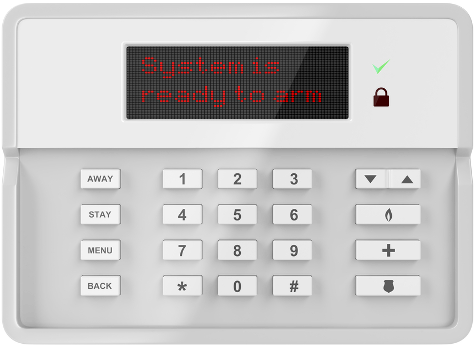Purchasing Guide For Home Security
Every 15 minutes, a home in the United States is burglarized. However, 60% of these burglary attempts are foiled by a home alarm system. Criminals like preying on easy targets. If a criminal thinks you are protected, they will be less inclined to burglarize. Protecting your family with a home alarm system is the best way to protect yourself from a would-be burglar. {' '}
Choosing Hardwired vs Wireless
When selecting an alarm system, you have two choices available. The first choice is between a hardwired system or a wireless system.
Hardwired alarm systems are physically attached to the master control system. The need for physical wiring can make a hardwired system more difficult as a DIY project. You will need access to power tools in order to install running wires in the walls and ceilings as subtly as possible. Leaving wires out in the open makes them easy for a criminal to snip or disable. However, a hardwired system is reliable since a criminal would have to knock down a wall to disable it. Most criminals would not be willing to go through that much work to burglarize a house.
Wireless alarm systems are much simpler to install. The range covered by a wireless system can be expanded or adjusted at the control station. A wireless system also requires minimal maintenance. So long as you regularly replace the batteries, a wireless home alarm system will reliably protect your home.
Monitored vs Unmonitored
The next choice when selecting an alarm system is choosing between monitored or unmonitored security systems. A monitored alarm system will automatically notify the authorities of a breach. This will get help dispatched to your home quicker. However, monitored systems are more expensive. To keep a monitored system running, you must have a telephone line, and pay a monthly monitoring fee. An unmonitored system is much more affordable, and will sound an alarm when it detects a breach. But even though an alarm will go off, either you or your neighbors will have to call the authorities. {' '}
Understanding Each Alarm System
The next step to choosing an alarm system is understanding the components of each system and how they work.
- The Central Control Panel is the computer part of the system. This is where the system decides whether there is a breach or not. If this system is monitored, the central control panel is what sends a distress signal through the phone line and to the authorities. This is also where the backup battery is kept.
- The Keypad is where you can activate the system when you leave the house or go to bed. If the security system is activated by accident, this is where you would deactivate the alarm
- Sensors what physically detects a breach. Sensors can detect things like broken glass, opened doors, or opened windows. These sensors are often activated with door or window contacts.
- Sirens are extremely loud alarms that trigger after a breach. These alarms can usually be heard through an entire building.
- Panic Buttons exist when you want to manually set off an alarm. If a burglar slips past an alarm (say if they trick you into letting them in or slip in through an open door) panic buttons can be used to alert the rest of the building that there is a problem. If your system is wireless, you may be able to press a panic button on your phone or device. If your system is hardwired, you will be able to hit a panic button on the central control panel‘s keypad.
Pricing
A hardwired system‘s cost depends on the number of doors and windows you want to cover. The more entry points you want to cover, the more expensive a hardwired system will be.
- Door and Window Sensors can cost $50-$100 per entry point covered
- Motion Sensors can cost $100-$150
- Glass Break Sensors can cost $100-$150
- Smoke and Carbon Monoxide Detectors can cost $75-$150
- Additional Keypads to access the security system from different locations in the building can cost $100-$150 per additional keypad
Some professional installation companies offer free installation packages with extended contracts. A DIY package can cost anywhere from $25-$1000 depending on which package you buy.

